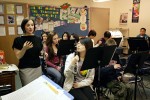Title
When I tell people I am one of 20 fellows of the Academy—A Program of Carnegie Hall, the Juilliard School, and the Weill Music Institute, in partnership with the New York City Department of Education, I usually receive a puzzled look. Then, the questions follow: “Wait, what do you do?” and “What exactly is that?”
Body
Admittedly, our title is complicated and requires some clarification. Yes, we perform in Carnegie Hall, but also in other venues all around New York. No, the Academy is not a Juilliard graduate program—some of us are Juilliard alumni, but many fellows have degrees from other music programs. And yes, we teach in the public schools, not as traditional band or orchestra directors, but instead as teaching artists, coaches, and mentors in both instrumental and general music programs. Even so, this description does not fully encompass our activities, interests, or our mission, which all seek to fulfill a higher purpose than one of simply performing or teaching.
At its core, the Academy, founded in January 2007, aspires to redefine what it means to be a musician in the 21st century. It is a groundbreaking initiative that combines the values of artistic excellence, arts advocacy, leadership, and education, hoping to create a new generation of musicians who are as committed to engaging their communities as they are to performing.
One key element of engagement is making connections on- and off-stage—connections with each other, with our audiences, with our students, with the greater music community, and with the general public. It is our hope that fostering these relationships will cultivate a fresh or renewed love of the arts and creativity, not only to bring in new audience members, but also to show all people, young and old, the relevance of classical music to their daily lives.
As trumpet fellow Brandon Ridenour (B.M. ’07) pointed out in a recent interview with The Journal, “Through our involvement in public schools, the Academy helps to build a foundation for the next generation of young artists and appreciators/supporters of the arts. This is important for the arts’ continued growth and prosperity. It is our duty to pass the torch and inspire young music makers and enthusiasts.”
Each Academy fellow is partnered with a public school in one of the five boroughs, and closely collaborates with the school’s instrumental teacher. Our presence in these music programs not only aids with day-to-day musical improvement and instrumental skills, but also provides enrichment to students who might not otherwise have access to live, top-notch classical music. Through tours of interactive performances, we reach literally thousands of students, allowing them the opportunity to hear in their schools the same chamber music that we are performing in concert halls.
These interactive performances also challenge us, the fellows, to find appropriate ways to introduce this intellectually demanding music so that the students better understand and appreciate the performance. These special, individualized concerts put our communication skills, musicianship, and energy levels to the test: we often perform the same show four times in one day. I can report that once you’ve performed the Villa-Lobos’ Wind Quintet at 8:30 a.m., playing it at a regular evening concert seems effortless!
During my school residency, my students have repeatedly demonstrated that they experience music of all centuries and genres with joy, receptivity, and hunger. They are able to find equivalent beauty, energy, and emotion in the music of Carter or Bach, Piazzolla or Puccini, as long as they’re shown a point of entry into the music.
We face this same test outside the schools—how do we communicate and connect with audiences, no matter their age, perspective, background, or musical experience? French horn fellow Leelanee Sterrett said, “Being in the Academy has shown me the importance of being able to clearly articulate who I am and what I want to share through music. This year, I’ve experienced firsthand that powerful communication skills are the best tools I have. And just like any aspect of making music, these skills take practice and constant reconsideration to keep them honed and ready for use. I’ve come to really appreciate the difference that meaningful communication and interaction makes in bringing in a wider audience.”
The Academy’s multifaceted mission is unique among postgraduate training programs: it combines superior artistic quality and chamber music performance with outreach, education, engagement, professional development, and leadership. During any given week, the fellows may be performing with conductors Simon Rattle or David Robertson in Carnegie Hall, collaborating with guests artists such as pianist (and Juilliard alumnus and faculty member) Emanuel Ax, attending a seminar with public relations expert Mary Lou Falcone, or helping trombone students in the Bronx prepare for their spring concert. As fellows, we are provided with a plethora of career-shaping opportunities, musically and otherwise, that open our eyes to new possibilities.
As viola fellow Margaret Dyer said, “It has been difficult to balance the principles of reaching for the highest artistic product and simultaneously giving back to society. [But] backed by these incredible institutions, we have a huge amount of resources and support to help reshape the face of classical music and its effect on our community.”
As we close in on the end of the first year of our two-year fellowship, our class of fellows has unofficially adopted the mantra, “We are performers, teachers, and advocates.” It is our belief that just as our society and world are changing, so is the classical music profession. However, while many skeptics will insist that classical music is dying, the wonder, curiosity, electricity, and open-mindedness that our students display every time we walk into the classroom tell us otherwise.





